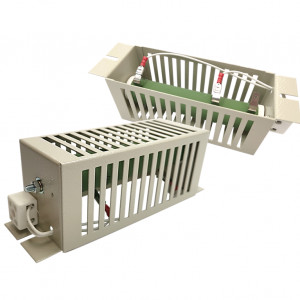Anti Condensation Heater Essential Protection for Electrical and Industrial Equipment
In industrial environments and electrical systems, one of the most overlooked challenges is condensation. Moisture accumulation inside control panels, switchgear, and sensitive electrical enclosures can lead to corrosion, short circuits, and expensive downtime. This is where an Anti Condensation Heater plays a crucial role. Designed to regulate temperature and reduce moisture, these heaters are indispensable for protecting valuable equipment and ensuring reliable performance.
Why Condensation Is a Serious Risk
Condensation forms when warm, humid air comes into contact with cooler surfaces, leading to water droplets inside enclosures. For electrical systems, this moisture can cause:
- Corrosion of metal components
- Insulation damage and reduced lifespan of cables
- Electrical faults and short circuits
- Costly repair or replacement of equipment
In industries where consistent performance is non-negotiable, preventing these risks is far more cost-effective than addressing the consequences of moisture damage.
The Function of an Anti Condensation Heater
An Anti Condensation Heater is specifically designed to maintain the internal temperature of enclosures slightly above the ambient dew point. This simple yet highly effective solution prevents the formation of moisture inside sensitive equipment. By keeping electrical cabinets dry and free of condensation, these heaters extend the life of machinery, reduce maintenance costs, and minimize downtime.
Key Benefits of Using Anti Condensation Heaters
- Enhanced Equipment Reliability – Preventing condensation ensures uninterrupted performance of electrical systems.
- Cost Savings – Reduces the need for frequent repairs and replacements caused by moisture damage.
- Improved Safety – Protects against short circuits and electrical hazards due to damp environments.
- Energy Efficiency – Modern heaters are compact, efficient, and designed to consume minimal power while delivering maximum protection.
- Versatility – Suitable for use in switchgear panels, control cabinets, telecommunications equipment, wind turbines, and various industrial applications.
Applications Across Industries
The demand for Anti Condensation Heaters spans multiple industries. Manufacturing plants rely on them to keep automation systems functional, while power utilities use them to safeguard switchgear. Telecommunications providers prevent service interruptions by installing them in outdoor cabinets. Even renewable energy sectors, such as wind and solar, utilize these heaters to ensure equipment remains reliable despite fluctuating weather conditions.
Choosing the Right Anti Condensation Heater
Selecting the appropriate heater depends on several factors, including the size of the enclosure, power rating, installation environment, and specific application requirements. Common models range from small panel heaters to more robust designs for larger systems. Some heaters feature built-in thermostats or are paired with hygrostats for automatic operation, making them both efficient and convenient.
Final Thoughts
As industries become increasingly reliant on sophisticated electrical and electronic systems, ensuring equipment longevity and operational stability is critical. Installing an Anti Condensation Heater is a small investment that provides long-term protection against moisture-related failures. By proactively preventing condensation, businesses can achieve improved reliability, reduced maintenance costs, and enhanced safety across their operations.



Leave a Reply
Want to join the discussion?Feel free to contribute!